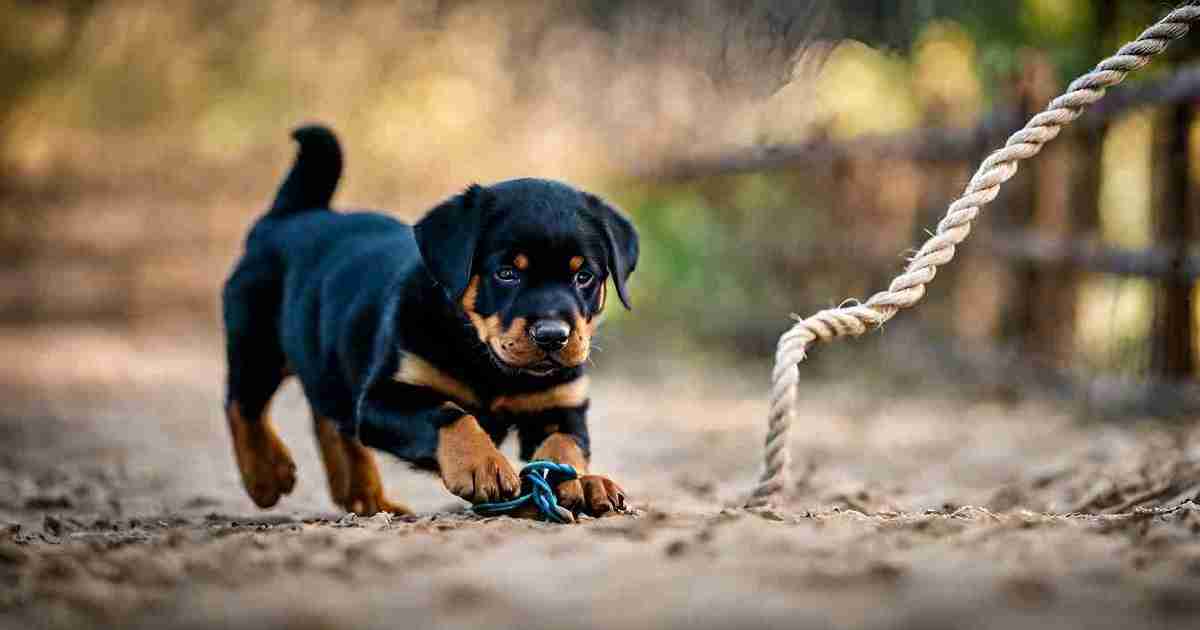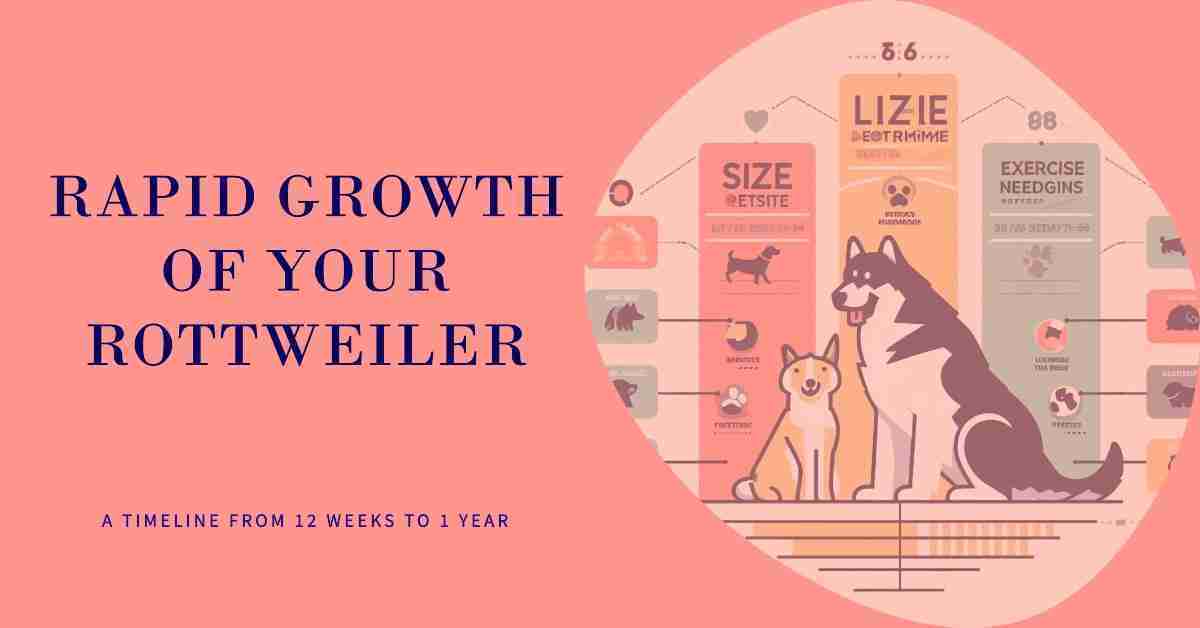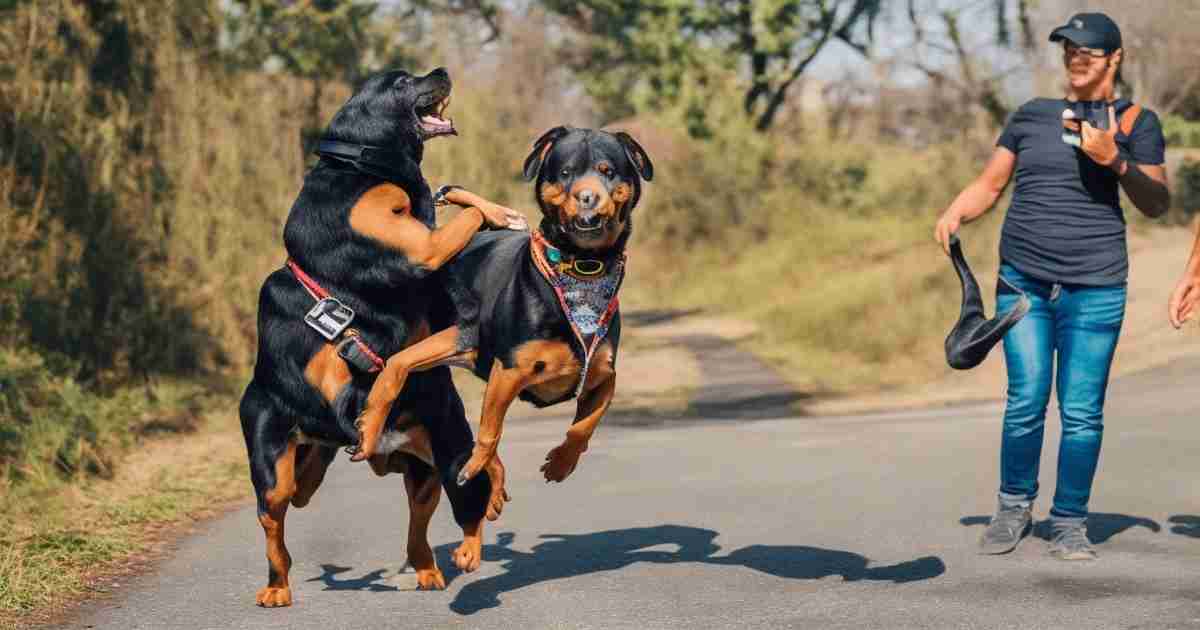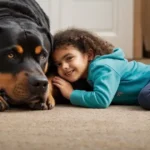Meet Maverick, the Rottweiler Puppy
I still remember the day my family brought home our rambunctious Rottweiler puppy, Maverick. At just 12 weeks old, he was a bundle of sharp teeth and boundless energy. Little did I know then how much he would change our lives.
Meet the 12-week-old Rottweiler
Maverick came bounding into our home, tail wagging and ready to explore his new surroundings. My siblings and I took turns cradling the squirming pup, amazed by his large paws and almost too big a head. Though small, it was clear this feisty canine would grow into a powerful companion.
The Significance of Puppyhood
The first few months with Maverick were filled with many lessons and memorable moments:
- Housebreaking a puppy requires patience and consistency. We quickly learned to watch for signals that Maverick needed to go outside.
- Socialization is critical during puppyhood. We exposed Maverick to new sights, sounds, people, and other dogs.
- Training started immediately with simple cues like “sit” and “stay.” Establishing good behavior early is key.
- Despite landshark tendencies, Maverick loved to snuggle and would often nap on our laps or feet.
- His innate guarding instinct emerged early. Maverick was always alert and watchful when strangers approached.
Though challenging at times, raising a Rottweiler puppy cemented Maverick as a beloved member of our family.
Getting to Know Rottweilers
The Rottweiler breed has its origins as rugged cattle dogs in the Roman Empire. Their name comes from the town of Rottweil, Germany where these canines herded livestock and pulled carts of butchered meat to market. Rottweilers were eventually used by police and military in search and rescue efforts.
Today, Rottweilers are admired for their:
- Strength and substantial build
- Intelligence and trainability
- Protective nature and loyal devotion to family
Though imposing in stature, properly socialized Rottweilers are good-natured companions when raised responsibly.
Unique Rottweiler Traits
Some standout qualities of Rottweilers include:
- Blocky heads and muscular frames
- Signature black coats with mahogany markings
- Docked tails accentuating their sturdy appearance
- Webbed paws make them great swimmers
- High energy perfect for active owners
Rottweiler puppies start off small but grow rapidly. A 12-week-old Rottweiler may weigh 20-30 pounds but reach 80-135 pounds at maturity! Proper diet and exercise keep these large dogs healthy.
Rottweiler Temperament at 12 Weeks
The personality of a 12-week-old Rottweiler puppy reflects their breed’s renowned temperament in many ways:
- Curious and playful – loves exploring surroundings and engaging in games
- Eager to learn – responds well to training with positive reinforcement
- Cuddly and affectionate – enjoys physical touch and bonding with family
- Alert and observant – watches intently when interacting with new people or dogs
- Fearless and feisty – exhibits confidence beyond their small size
With patient socialization and training, these traits nurture the Rottweiler’s transition from puppy to steadfast companion animal. Their youthful exuberance makes raising a Rottweiler pup truly rewarding.
Puppy-Proofing Your Home
Welcoming a rambunctious Rottweiler puppy into your home requires prep to keep them safe and your belongings intact.
What steps should you take? Start by asking yourself: What potential hazards lurk in my space? Then get busy removing or securing anything that could harm an inquisitive pup. Take small objects off low shelves and tables.
They’ll end up as toys…or choking hazards. Use baby gates to cut off access to places like the laundry room.
Hide wires and tie up loose cables since pups relish chewing on them. Set up a crate in a central spot for naps and timeouts. And don’t forget to stock up on approved chews to satisfy the need to gnaw.
Puppy-proofing ahead of time prevents problems and saves you headaches later.
Essential Supplies for Rottweiler Puppies
Prepping for the arrival of your 12-week-old Rottweiler means gathering must-have supplies. We’ve made a puppy prep shopping list to get you started:
Collar and leash – For identifying your pup and going on walks
Crate – Provides a cozy, secure place for sleeping and alone time
Puppy kibble – High-quality food supports healthy growth
Steel bowls – Avoid bacteria and tipping accidents
Brush – Removes loose hair from their thick coats
Interactive toys – Stimulate their mind and satisfy their energy
Tasty treats – Positive reinforcement for training
Pee pads – Aid the potty training process
Plush bed – A comfy spot for lounging and sleeping
Grooming kit – Nail clippers, shampoo, comb, etc.
Custom ID tag – Include your contact information
Shopping for your Rottweiler pup sets them up for success. But don’t forget, they’ll thrive with ample patience and love!
Welcoming Your Rottweiler
The first day home can seem overwhelming for a Rottweiler pup and their new family. Let your bouncing bundle of fur take the lead, sniffing out and exploring their unfamiliar surroundings at their own curious pace.
No need to cram in formal introductions right away. Simply allow your puppy to investigate every nook and cranny of their new domain. Have some quiet corners set up as retreats for when the chaos becomes too much?
Remember, this major life transition is incredibly stressful for a young pup! Lavish your little one with extra doses of patience, empathy, and snuggles.
Frequently reassure your apprehensive pup in a gentle tone. Form an unbreakable bond through belly rubs, playful romps, and long lazy cuddle sessions.
Establish a predictable potty schedule immediately to reinforce good habits. Start brief, positive training sessions to instill manners. Above all, focus your energy on building a solid foundation of trust.
Creating a Safe Space
Having a dedicated puppy zone is the key to your Rottie’s security and your peace of mind. A comfy crate or small room like a kitchen works perfectly.
Be sure to include soft bedding to cushion their slumber, a water bowl to refresh their parched palate, engaging toys to occupy their curious mind, and chew bones to satisfy their shark-like tendencies.
When supervision time expires, gently settle your worn-out whelp into their space with something to gnaw.
Use a phrase like “kennel up” when creating to cement the cue. Reward their compliance with fulsome praise and tasty treats.
This ritual teaches independent relaxation and prevents destructive chaos. But never isolate your impressionable pup for too long – they require socialization and play to thrive!
Feeding and Nutrition
Good chow fortifies your growing Rottweiler. Follow these diet tips:
- Pick a high-quality kibble with meat as the first ingredient.
- Offer smaller meals since their tummy is petite.
- Time feedings on a consistent schedule to promote potty training.
- Always provide fresh water, especially on hot days.
- Monitor portion to avoid overfeeding.
- Give treats in moderation to prevent unhealthy weight gain.
Consult your vet for advice on the ideal diet for your pup’s age, weight, and activity level. Proper nutrition plus exercise gives your Rottie the best start!
Socialization and Training for Your 12-Week-Old Rottweiler
Caring for a Rottweiler puppy involves important socialization and training. Here’s how to get started.
The Importance of Socialization
Proper socialization transforms a Rottweiler puppy into a confident, friendly companion. It involves exposing them to a wide variety of:
- People – men, women, children, elderly, different ethnicities
- Other dogs and pets – all sizes and breeds
- Environments – car rides, parks, stores, elevators
- Noises – traffic, construction, alarms
- Handling – paws, ears, tail, mouth
Introduce new things gradually in positive contexts with praise and treats. This teaches your 12-week-old Rottweiler puppy to behave appropriately around anything they may encounter.
Basic Training for a 12-Week-Old Rottweiler
Rottweiler puppies are highly intelligent and trainable. Start teaching basic cues like:
- Sit – Have them sit before meals, playtime, and door exits.
- Stay – Increase time duration gradually.
- Come – Reward with praise and treats.
- Leave it – Prevents inappropriate chewing.
- Drop it – Important for relinquishing objects.
- Crate – Enter crate and settle on command.
Keep sessions brief and upbeat. Use rewards-based techniques, never punishment. Instilling good manners in your young Rottweiler establishes lifelong obedience.
Housetraining Tips
Housetraining is essential for an indoor Rottweiler puppy. Follow these tips:
- Take them out frequently, at least every 2 hours.
- Go to the same spot each time and use a command like “go potty.”
- Reward and praise immediately after they go.
- Limit access indoors when unsupervised.
- Clean all accidents thoroughly with enzymatic cleaner.
- Watch for pre-potty signals like circling or sniffing.
- Be extremely consistent and never punish mistakes.
With patience and consistency, your 12-week-old Rottweiler will quickly learn good housetraining habits.
Physical and Mental Development of a 12-Week-Old Rottweiler
Monitoring your puppy’s growth and providing proper stimulation is key for a healthy Rottweiler.
Growth Milestones
At 12 weeks old, Rottweiler puppies typically:
- Weigh 15-25 lbs
- Stand about 14 inches tall
- Have needle-sharp puppy teeth
- Show signs of independence
- Have boundless energy
- Take frequent naps
- Outgrow collars rapidly
Rottweilers grow quickly, gaining 5-10 lbs per week. Track your puppy’s development and make adjustments as needed.
Exercise Needs
Despite their size, 12-week-old Rottweilers need restraint on exercise to protect developing joints:
- Several short walks daily
- Free play in a fenced yard
- Low-impact games like fetching soft toys
- Multiple potty breaks
- Always monitor for signs of fatigue
Avoid forced running, jumping, or climbing stairs. Provide mental stimulation instead to meet their needs.
Mental Stimulation
Smart Rottweiler puppies thrive with mental stimulation:
- Food puzzle toys
- “Find it” games with treats
- Obedience and trick training
- New toys to investigate
- Socialization experiences
This gives your pup’s mind a workout. A mentally tired puppy equals a well-behaved companion. Mentally engage your 12-week-old Rottweiler daily to supplement physical activity.
Proper exercise and training enhance development for Rottweilers at this key puppy life stage. Adjust activities based on their growing abilities.
Healthcare for 12-week-old Rottweiler Puppies
Caring for a Rottweiler puppy involves proper veterinary care and grooming. Here are some key health considerations.
Vaccinations and Preventive Care
At 12 weeks, your Rottweiler puppy should have:
- Completed their first set of vaccinations for core diseases
- Been dewormed for intestinal parasites
- Had a physical exam to check the development
- Discussed spay/neuter timelines with your vet
Schedule vet visits every 3-4 weeks for boosters and wellness checks. Keep up with preventatives like flea/tick and heartworm medication. Catching issues early promotes your puppy’s long-term health.
Common Health Issues
12-week-old Rottweilers may experience:
- Diarrhea from diet changes or parasites
- Puppy urinary tract infections
- Skin irritations like rashes or yeast
- Tummy troubles like vomiting or gas
- Rapid growing pains
Notify your vet if these issues persist or worry you. Prompt treatment by a professional is important.
Grooming Your Rottweiler
Daily grooming is essential bonding time with your Rottweiler puppy:
- Brush coat 2-3 times weekly
- Trim nails every 1-2 weeks
- Check and clean ears weekly
- Brush teeth with dog-safe toothpaste
- Bathe every 3-4 weeks with mild puppy shampoo
Grooming helps your 12-week-old Rottweiler become comfortable being handled for exams and care. Make it a relaxing routine.
Working closely with your vet provides a strong foundation of health during your Rottweiler puppy’s crucial first weeks at home.
Nutrition and Diet for a 12-Week-Old Rottweiler
Proper nutrition supports your Rottweiler puppy’s rapid development and growth.
Appropriate Puppy Diet
For a 12-week-old Rottweiler, choose a premium puppy kibble that has:
- High-quality animal protein as the first ingredient
- Balanced vitamins and minerals
- Omega fatty acids for skin and coat
- Optimal calcium and phosphorus levels
- Probiotics to support digestion
Look for dog food made specifically for large-breed puppies. Avoid free feeding to control portions.
Feeding Schedule
12-week-old Rottweilers should be fed:
- 3-4 meals daily – Their stomach is small so they eat less per sitting
- On a consistent schedule – Helps with potty training and prevents bloat
- Appropriate serving sizes – Follow label guidelines for weight
- Plenty of fresh water – Especially important during housetraining
Feed at the same times daily. Pick up uneaten food within 15-20 minutes.
Dietary Concerns
Some key dietary considerations for Rottweiler puppies include:
- Overfeeding leads to rapid growth, which is hard on developing joints and bones
- Table scraps or people’s food, which can cause diarrhea or allergies
- Missing nutrients like calcium or protein needed for growth
- Dehydration if fresh water access is inadequate
- Intolerance to ingredients like corn or wheat
Discuss any concerns with your veterinarian to ensure your puppy’s diet optimally supports their needs. Providing the right nutrition will help your Rottweiler puppy thrive.
Fun Activities for Your 12-Week-Old Rottweiler
Puppies learn through play! Engaging your 12-week-old Rottweiler in fun activities provides enrichment and bonding time.
Playtime Ideas
Physical games help your Rottweiler puppy burn energy:
- Play tug-of-war and fetch using puppy-safe toys.
- Chase your pup around the yard or house.
- Have them “search” for treats you’ve hidden.
- Take your pup on structured leash walks to practice training.
Make sure to provide plenty of breaks and water during play sessions.
Interactive Toys
Puzzles and chews satisfy your puppy’s needs for mental stimulation:
- Feeding puzzles – Require using their brain to access kibble.
- Chew toys – Help relieve discomfort from teething.
- Food-dispensing balls – Reward their hard work with treats.
- Plush toys – Allow them to practice their “killing” instinct.
Rotate different interactive toys to prevent boredom. Supervise your puppy during play.
Socializing with Other Dogs
Carefully controlled play dates with vaccinated, gentle dogs and puppies give your Rottweiler valuable social skills. Introduce dogs slowly, watching closely for good body language. Provide lots of praise for polite interactions. Positive early experiences will build sociability.
Raising a Well-Behaved 12-week-old Rottweiler
Starting training early shapes your puppy into a mannerly companion.
Discouraging Unwanted Behavior
Undesirable puppy antics like nipping, barking, or potty accidents require patient, consistent correction:
- Redirect your pup’s energy into a more positive outlet.
- Use a firm “No” then ignore or walk away to discourage the behavior.
- Stick to a steady routine and reinforce good habits.
- Never punish physically – this damages trust.
With maturity and training, your Rottweiler will outgrow most puppy behaviors.
Positive Reinforcement Training
Make lessons fun by using praise, play, and treats to motivate your 12-week-old Rottweiler! Train basic cues like:
- Sit, stay, come, down, heel
- Gently taking treats or toys
- Enjoying handling and grooming
- Entering/exiting crates and doors politely
Keep training positive, structured, and consistent.
Obedience Classes
Enrolling your puppy in a reward-based obedience class allows for training, socialization, and bonding. Look for classes geared towards puppies that focus on:
- Relationship-building between owner and pup
- Developing good manners through positive methods
- Practicing skills in a supervised, controlled environment
- Giving your puppy valuable socialization with other dogs
An obedience class experience forms an incredible foundation, preparing your Rottweiler to be an outstanding canine citizen.
The Teenage Stage for Your Rottweiler
Like human teens, adolescent Rottweilers undergo changes that require patience and adaptability. Here’s what to expect.
Adolescence in Rottweilers
Between 6-18 months, your formerly obedient Rottweiler puppy may transform into a stubborn, willful teenager. This is a result of shifting hormones.
Common adolescent Rottweiler behaviors include:
- Testing boundaries and ignoring commands
- Increased independence and wanderlust
- Demanding more exercise and mental stimulation
- Acting shy, fearful, or aloof around strangers
These changes are temporary but require an adjustment in handling. With understanding and consistency, you can guide your Rottweiler through this tricky developmental stage.
Adapting to Changing Needs
To meet the needs of your adolescent Rottweiler:
- Double down on exercise – Longer walks, hiking, swimming
- Increase training – Refresh obedience skills regularly
- Provide new challenges – Advanced commands, agility, puzzles
- Maintain strict structure and rules – Be firm and consistent
- Practice more socialization – Ensure continued confidence
- Spend quality one-on-one time – Strengthen your bond
Keeping their brain and body occupied prevents boredom and destructive behaviors.
Behavioral Challenges
Common Rottweiler teenage behavioral issues include:
- Barking or whining for attention
- Destructive chewing due to anxiety
- Pulling strongly on a leash or not listening
- Guarding food, toys, or sleeping areas
- Jumping up on owners or guests
Correct unwanted habits patiently using positive reinforcement training. Be consistent and don’t reinforce bad behaviors. Your handsome adolescent will mature into a well-mannered adult!
Exercise and Fitness for Your Rottweiler
Fulfilling your Rottweiler’s exercise needs is vital for their health and happiness.
Tailoring Exercise to Age
The exercise your Rottie requires changes as they mature:
- 12-16 weeks – Short, controlled leash walks
- 4-8 months – Moderate walks, playtime, socialization
- 9-18 months – More rigorous exercise as their frame develops
- Adulthood – At least 60-90 minutes daily
Adjust activities to match their physical abilities at each life stage.
Outdoor Adventures
Rottweilers thrive when enjoying outdoor adventures with their owners:
- Long hikes
- Backyard play sessions
- Trips to the dog park or beach
- Agility courses
- Swimming – great low-impact exercise
- Interactive games like fetch
Mental stimulation is just as important as physical activity.
Health and Fitness Benefits
Fulfilling your Rottweiler’s exercise needs provides many benefits:
- Maintaining a healthy weight
- Preventing obesity and joint issues
- Relieving anxiety, boredom, and stress
- Strengthening your bond through shared activities
- Providing mental stimulation and enrichment
- Allowing them to fulfill their guarding/working instincts
- Supporting overall wellness and extending lifespan
Daily activity enhances your Rottweiler’s quality of life immensely. Make exercise a lifelong priority.
Handling Common Challenges with Your Rottweiler
Rottweilers are highly intelligent dogs but can present some unique challenges. Here’s guidance on addressing common issues.
Rottweiler Aggression Myths
Despite stereotypes, Rottweilers are not naturally aggressive. Potential causes of reactive behavior in a Rottweiler include:
- Lack of proper socialization
- Fear, anxiety, or insecurity
- Protective instincts kicking in
- Poor breeding or genetics
- Abuse or neglect
With training, socialization, stability, and TLC from a strong leader, Rottweilers make wonderfully devoted companions.
Separation Anxiety in Rottweilers
Rottweilers form intense bonds with their families. Separation anxiety can cause a Rottweiler to exhibit behaviors like:
- Barking or howling
- Destructive chewing
- Accidents around the home
- Pacing and restlessness
To minimize separation anxiety in your Rottweiler, provide:
- Plenty of exercise before leaving
- Distraction with a food puzzle
- Comfort with a worn T-shirt
- A predictable departure routine
Additionally, training exercises and anti-anxiety products can help ease a Rottweiler’s stress.
Barking and Digging in Rottweilers
Rottweilers may bark or dig due to:
- Boredom
- Seeking attention
- Reactiveness to stimuli
- Pent up energy
Strategies to curb unwanted barking or digging in your Rottweiler include:
- More walks and playtime
- Obedience training
- Distracting with toys when barking
- Redirecting the energy into appropriate outlets
- Ensuring their needs are met
With time and consistency, you can control these behaviors in your Rottweiler.
Building a Strong Bond with Your Rottweiler
A close owner-dog bond enhances your Rottweiler’s happiness and behavior.
Quality Time Together
Set aside daily one-on-one time for activities you both enjoy. This may include:
- Long walks or hikes
- Playing fetch games
- Training sessions
- Cuddling on the couch
- Car rides
This focused attention strengthens your connection.
Communication and Trust
Bonding with your Rottweiler relies on open communication and trust. Ways to cultivate this include:
- Clear and consistent training
- Respecting their signals
- Handling them gently
- Keeping a predictable schedule
- Responding to their needs
Mutual understanding prevents frustration.
Love and Affection
Don’t be afraid to shower your Rottweiler with love! Important ways to show your devotion include:
- Belly rubs, massages, and cuddling
- Thoughtful gifts like new toys
- Allowing them to sleep on your bed
- Hand feeding treats
- Speaking softly and positively praising
Nurturing an unbreakable friendship brings you both joy. Your loyalty and compassion will be reciprocated tenfold.
Taking Care of Your Adult Rottweilers Nutrition
Ensuring your adult Rottweilers’ being and longevity begins with providing the diet.
Transitioning, to Adult Food
When your Rottweiler reaches the age of 12 to 18 months it’s time to switch them from food to adult dog food;
Monitoring Diet and Weight
To keep your adult Rottweiler in shape and maintain their overall health;
Specific Dietary Considerations
Certain adult Rottweilers may require specialized nutritional attention, such as those with;
As your adorable 12-week-old Rottweiler grows into an adult dog focusing on their nutrition will pave the way for a long and healthy life.
Promoting Health and Longevity in Rottweilers
Taking care of your Rottweiler’s being ensures a lasting and fulfilling companionship.
Lifespan of Rottweilers
On average a Rottweiler’s lifespan ranges from 8 to 11 years. Several factors can influence their longevity, including;
Regular Health Checkups
visits to the veterinarian play a role, in maintaining your rottweiler’s health;
Enhancing Quality of Life
You can enhance the joyous years of your senior Rottweiler by;
From the moment you welcome home your adorable 12-week-old Rottweiler until they reach their golden years prioritizing their health enables them to live life joyfully to its fullest potential.
Exercise and Play for Adult Rottweilers
Fulfilling your adult Rottweiler’s needs for activity keeps them fit and engaged.
Daily Exercise Requirements
Adult Rottweilers require 60-90 minutes of daily activity:
Advanced Training
Mentally challenge your adult Rottweiler by teaching:
Sport and Competitions
Adult Rottweilers excel at canine sports like:
Keeping your faithful companion active and enriched from puppyhood to adulthood ensures they live their best life.
Grooming and Maintenance for Rottweilers
Consistent grooming promotes your Rottweiler’s health and hygiene.
Coat Care
To maintain their striking coat:
Dental Hygiene
Caring for your Rottweiler’s teeth involves:
Nail Trimming and Ear Cleaning
Other grooming essentials include:
From the time they are a 12-week-old Rottweiler puppy throughout adulthood, staying on top of grooming allows your dog to look and feel their very best.
Let me know if incorporating the primary keyword naturally in the opening and closing paragraphs works! I’m happy to revise if needed.
Frequently Asked Questions about Rottweilers
New and experienced Rottweiler owners often have questions. Here are answers to some common ones.
A. Common Concerns about Rottweiler Puppies
Raising a Rottweiler puppy comes with some unique challenges. Frequently asked questions include:
B. Addressing Behavioral Issues
Rottweiler owners may need help with training and discipline. Common questions cover:
C. Rottweiler Health FAQs
Owners want to safeguard their Rottweiler’s wellbeing. Hot topics include:
Regardless of what questions stand up in worrying for your 12-week-old Rottweiler or grownup dog, rest confident answers are available! Don’t hesitate to invite me.
Conclusion
Bringing home and raising a Rottweiler is an incredibly rewarding journey.
Those early days with your 12-week-old Rottweiler puppy lay the foundation for an amazing friendship. Cherish the memories!
The loyalty, love, and companionship of a Rottweiler enriches life immensely. Their noble spirit shines through.
From the time they are a silly 12-week-old Rottweiler pup, you look forward to enjoying a long, happy life together with your devoted four-legged friend.















1 thought on “Powerful 12-Week-Old Rottweiler: Your Loving New Companion”